Serving 215 students in grades Prekindergarten-12, David Ellis Academy ranks in the bottom 50% of all schools in Michigan for overall test scores (math proficiency is bottom 50%, and reading proficiency is bottom 50%).
The percentage of students achieving proficiency in math is 6-9% (which is lower than the Michigan state average of 34%). The percentage of students achieving proficiency in reading/language arts is 20-24% (which is lower than the Michigan state average of 45%).
The student:teacher ratio of 14:1 is lower than the Michigan state level of 17:1.
Quick Stats (2025)
- School Type: Charter School
- Grades: Prekindergarten-12
- Enrollment: 215 students
- Student:Teacher Ratio: 14:1
- Overall Testing Rank: Bottom 50% in MI
- Math Proficiency: 6-9% (Btm 50%)
- Reading Proficiency: 20-24% (Btm 50%)
- Science Proficiency: 11-19% (Btm 50%)
- Source: National Center for Education Statistics (NCES), MI Dept. of Education
Top Rankings
David Ellis Academy ranks among the top 20% of public schools in Michigan for:
Category
Attribute
Percent Eligible For Free Lunch
School Overview
David Ellis Academy's student population of 215 students has declined by 29% over five school years.
The teacher population of 15 teachers has grown by 15% over five school years.
School Type
Grades Offered
Grades Prekindergarten-12
(offers virtual instruction)
(offers virtual instruction)
Total Students
215 students
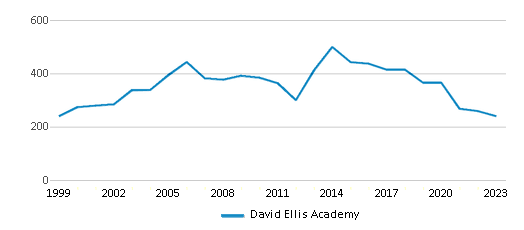
Gender %
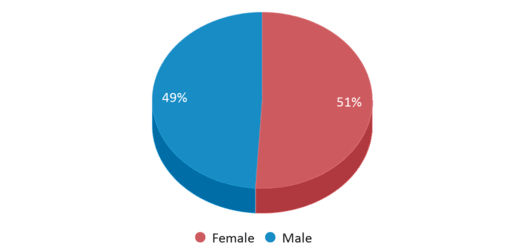
Total Classroom Teachers
15 teachers
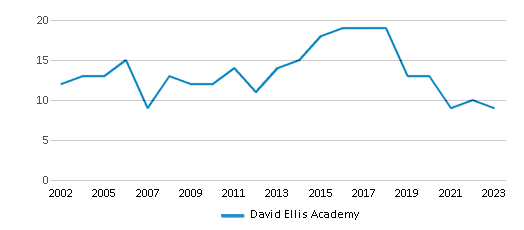
Students by Grade
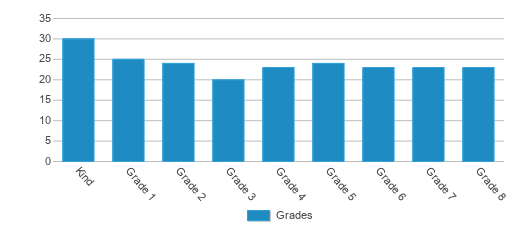
School Rankings
David Ellis Academy ranks within the bottom 50% of all 3,069 schools in Michigan (based off of combined math and reading proficiency testing data).
The diversity score of David Ellis Academy is 0.00, which is less than the diversity score at state average of 0.56. The school's diversity has stayed relatively flat over five school years.
Overall Testing Rank
#2684 out of 3069 schools
(Bottom 50%)
(Bottom 50%)
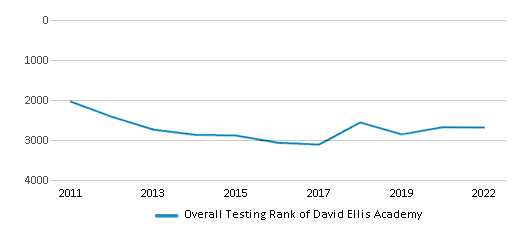
Math Test Scores (% Proficient)
6-9%
34%
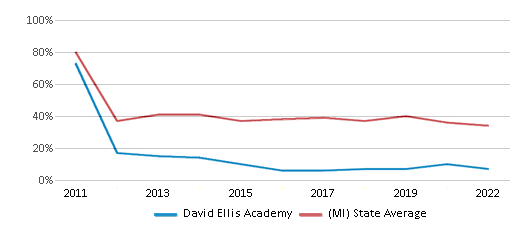
Reading/Language Arts Test Scores (% Proficient)
20-24%
45%
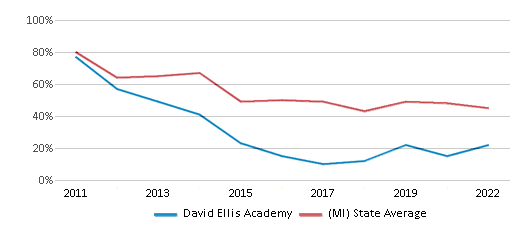
Science Test Scores (% Proficient)
11-19%
38%
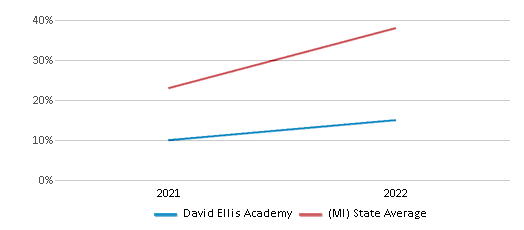
Student : Teacher Ratio
14:1
17:1
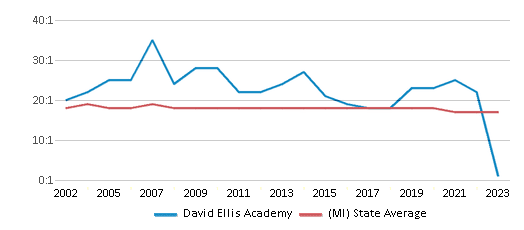
American Indian
n/a
1%
Asian
n/a
4%
Hispanic
n/a
9%
Black
100%
18%
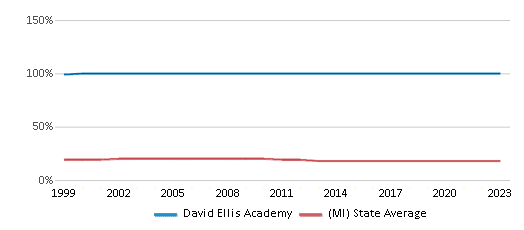
White
n/a
63%
Hawaiian
n/a
n/a
Two or more races
n/a
5%
All Ethnic Groups
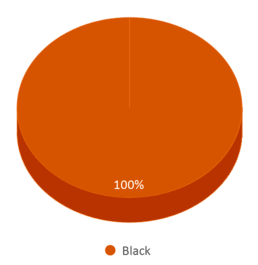
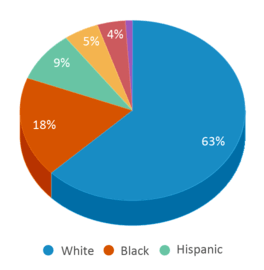
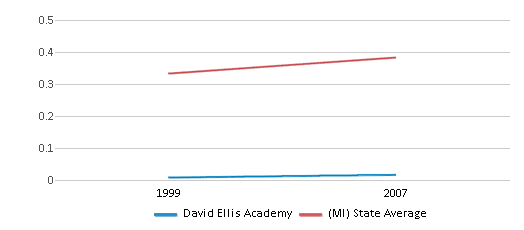
Participates in the National School Lunch Program (NSLP)
Yes
Eligible for Free Lunch
89%
50%
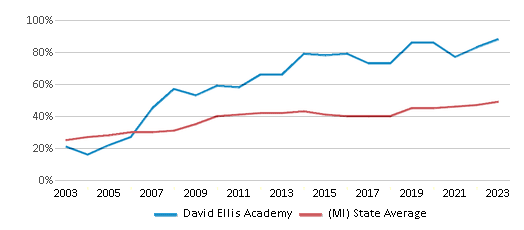
Eligible for Reduced Lunch
2%
4%
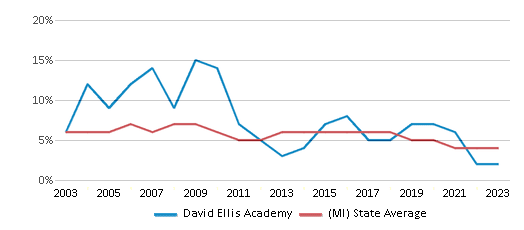
School Statewide Testing
School District Name
Source: National Center for Education Statistics (NCES), MI Dept. of Education
Profile last updated: 02/09/2025
Frequently Asked Questions
What is David Ellis Academy's ranking?
David Ellis Academy is ranked #2684 out of 3,069 schools, which ranks it among the bottom 50% of public schools in Michigan.
What schools are David Ellis Academy often compared to?
David Ellis Academyis often viewed alongside schools like Cooke Stem Academy, Cornerstone Jeffersondouglass Academy by visitors of our site.
What percent of students have achieved state testing proficiency in math and reading?
6-9% of students have achieved math proficiency (compared to the 34% MI state average), while 20-24% of students have achieved reading proficiency (compared to the 45% MI state average).
How many students attend David Ellis Academy?
215 students attend David Ellis Academy.
What is the racial composition of the student body?
100% of David Ellis Academy students are Black.
What is the student:teacher ratio of David Ellis Academy?
David Ellis Academy has a student ration of 14:1, which is lower than the Michigan state average of 17:1.
What grades does David Ellis Academy offer ?
David Ellis Academy offers enrollment in grades Prekindergarten-12 (offers virtual instruction).
What school district is David Ellis Academy part of?
David Ellis Academy is part of David Ellis Academy School District.
In what neighborhood is David Ellis Academy located?
David Ellis Academy is located in the Tri Point neighborhood of Detroit, MI.
School Reviews
1 8/12/2019
Great Staff, Awesome Teachers very hands approach and parent involve orientated. Principal intentions are in the right place but not empathetic, but resources very disorganized, which can create hectic outcomes with parents. Contributing to the destruction of foundation needed to raise school overall ranking to top 10% in the state. Also informed of Lack of summer academics programs to actually help a student that struggles in all grades. Several locations of school but no funding of summer academics, along with no efficient parking to accommodate parents with dropping off, and picking up children from school.
2 7/18/2008
The school is old and run down. The administration seems to be disorganized because meetings and activities get cancelled at the last minute. The test scores are low and there is no teacher accountability. I definately would NOT recommend this substandard school.
2 6/9/2008
Poor academic programs, no specials available, VERY DISORGANIZED, field trips cancelled at the last second, lazy teachers, Detroit school is falling apart, I am pulling my kids out as fast as I can.
Review David Ellis Academy. Reviews should be a few sentences in length. Please include any comments on:
- Quality of academic programs, teachers, and facilities
- Availability of music, art, sports and other extracurricular activities
Recent Articles

What Is A Charter School?
Explore the world of charter schools in this comprehensive guide. Learn about their history, how they operate, and the pros and cons of this educational innovation. Discover key facts about charter schools, including admission policies, demographics, and funding, as well as what to look for when considering a charter school for your child.

10 Reasons Why High School Sports Benefit Students
Discover the 10 compelling reasons why high school sports are beneficial for students. This comprehensive article explores how athletics enhance academic performance, foster personal growth, and develop crucial life skills. From improved fitness and time management to leadership development and community representation, learn why participating in high school sports can be a game-changer for students' overall success and well-being.

February 05, 2025
Understanding the U.S. Department of Education: Structure, Impact, and EvolutionWe explore how the Department of Education shapes American education, from its cabinet-level leadership to its impact on millions of students, written for general audiences seeking clarity on this vital institution.









